 Anyone who knows me knows that I Love Food. I also firmly believe that food is the best kind of medicine. I always encourage my patients to focus on their diet first if there is any chance of diet helping or changing their symptoms. After all, diet is something that while hard to change emotionally at times, is something you CAN change at will to improve your health. If it affects your symptoms, it also gives you control over your symptoms which can be a very empowering experience once you embrace that change. Today, therefore, is a list of 7 superfoods for aging well. Since Facial Rejuvenation Acupuncture, Anti-Aging and lasting health and wellness are a primary focus in my practice, it is my pleasure to bring you this concise yet well researched list of additions to your daily diet that can help you stay well! Enjoy this short and sweet list, try eating these foods more regularly and see how you feel. I hope you'll agree that they really are super! Olive Oil Olive oil is beneficial for many reasons. Researchers now know that this oil contains the antioxidants called polyphenols, which can help prevent age-related diseases. Fish Fish like wild caught salmon are a no-brainer. They are packed with omega-3 fatty acids, which help regulate cholesterol levels and can improve heart health, which become increasingly important to take care of as we age. Nuts Nuts like almonds are packed with vitamins and minerals, as well as antioxidants and other nutrients that help fight aging. Those who incorporate nuts into their diet are shown to potentially add years on to their lives. Nuts are a great way to also get more protein into your diet and keep you energized. Dark Chocolate Quality dark chocolate not only tastes good but can also be great for your health. Cocoa is packed with flavonoids that are good for heart disease and promote healthy blood vessels. Add a little dark chocolate into your diet to help lower your risk of high blood pressure, type 2 diabetes, kidney disease and dementia. Blueberries Blueberries are known for their high amount of antioxidant properties. These berries can help inflammation and age-related deficiencies such as memory loss and motor function. Avocado Avocado is filled with omega-3s and vitamin E, which prove to have many health benefits. If you are fighting aging skin, avocado is your go-to food for rejuvenating your skin as well as stronger nails and hair. Turmeric Turmeric is an incredible herb that is often used in Chinese medicine for its anti-ageing benefits. A part of the ginger family, turmeric contains curcuminoids, which act as a powerful antioxidant to that can reduce inflammation and promote healing. This herb is perfect for Asian cooking and to add a little spice to dishes. Sources http://bit.ly/1SukKry http://bit.ly/1qL3OY5 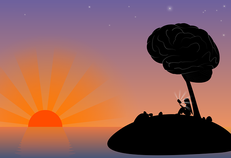 The second week of March is Brain Awareness Week, which I just couldn't ignore this year. Brain Health is a hot topic in my family these days - my mother has Vascular Dementia and lived with us for the past 6 years. In August she had a stroke and we were no longer able to keep her at home due to her high fall risk and low cognitive function. It has been a huge transition for us, and a huge reminder of how important brain health is to long term health and wellness. The truth of the matter is that you can never start paying attention to brain health too early, and the more you can prevent instead of treat the longer you will have a healthy brain. In light of Brain Awareness week, therefore, this is a perfect time to explore ways to keep your noggin working and healthy. Below are some easy, simple ways to keep your brain in good shape that my family and I try to observe. A healthy diet is a healthy mind There are many reasons to keep a healthy lifestyle and feed your body with foods that make you feel and perform your best. Diets that are low in saturated fats and cholesterol and higher in omega-3 fatty acids have been shown to promote brain health and protect brain cells. Taking a fish oil supplement with DHA or eating fish such as salmon can help improve brain development at any age. DHA, a type of omega-3, may also help prevent certain neurological disorders. Vitamin E and lutein can also help brain health. Incorporate leafy greens such as spinach and kale into your lunch or dinners. Keep your brain stimulated At any age, brain exercises are a great thing to get into the habit of. Keeping your brain stimulated can help retain your memory as you get older as well as your capability to learn new skills. The brain is never done learning. Exercises like reading, crosswords, number problems and games like sudoku can help keep your brain stay active and working. In particular, learning NEW things can help your brain create new neural connections bolstering its strength and vitality. You don't have to be good at something new, you just have to try to learn it so taking a new class or picking up a new hobby for 3-6 months can be brilliant for your brain. Furthermore, if you find yourself experiencing chronic stress, practice daily meditation for as little as five minutes a day to help reduce inflammation and support immune health, which are both controlled by the same area of the brain. Socialize Keeping in touch with friends and family and continuously working on building relationships helps your emotional state as well as your physical health. Surround yourself with people who challenge you, understand you and keep a positive tone. Join organizations or clubs you are interested in and make new connections. Feeling connected to others is always important for your mental wellbeing. Quit the bad habits If you smoke, now is the best time to quit. Consuming an excess in substances such as alcohol, cigarettes and other drugs can lower cognitive processes and decrease overall functioning and health. Acupuncture In Traditional Chinese Medicine it is believed that the spleen, kidney and heart organs all impact mental capacity and brain activity. These organs influence memory, concentration and recall. When one of these organs is experiencing deficiency or an imbalance, our brain can not function to its fullest. Acupuncture addresses the organs with specific points on the body to return the body back to balance and health. Sources: http://bit.ly/1PZsyVf 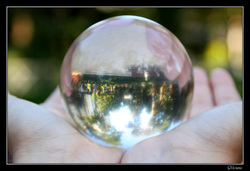 A coach once gave me an analogy I never forgot - that life is a juggling act and while most of the balls will bounce, health can be made of glass; if that ball breaks, it might never go back together quite the same. The key message? Health MUST be a priority in the juggling act we call life because of all the things we can recover from, a true health crisis can change our lives irrevocably and irreparably. Take a Lesson from the Heart - Put Your Health First Another good way to bring this message home, is to take a lesson from our own body processes - from the heart specifically. In our own bodies, the Heart actually pumps blood to itself first before it pumps blood anywhere else in the body. This is because the body knows that without proper nourishment of the Heart, everything else in the body will fail. Our lives are the same - if we don’t take care of ourselves, we cannot take care of anything or anyone else in our lives. Its imperative to put your health first, to have an eye on preventative care and stress management in particular, so that you know you are doing everything within reason in this moment in time to take care of yourself. If you can do that, you are much more likely to continue leading the long and healthy life you want to live. A Plan for Self Care that Works For YOUIf you don’t want to drop that glass ball, you’ve got to keep your eye on it, and the best way to do that is to have a plan for self care. I believe a successful self care plan needs to be simple and flexible because at different times in our lives (or even day by day) sticking to our plan can be more or less difficult. Your self care plan needs to assist and support your health, not stress you out, but you also have to be accountable to your goals to succeed in them. Having a plan can help you in all these areas. Devising your plan can be a simple exercise in assess, plan, execute. Then revise and repeat whenever necessary. STEP ONE - ASSESS You might know this right off the top of your head, but if you don’t take 5-10 minutes to make a mental tally (or physical list, your choice) of the areas you feel you are successful with your self care and the areas you feel you could improve. It should be something simple like this:
It doesn’t need to be exhaustive, but I do recommend including these categories - diet, exercise, sleep and stress. You can include as much or as little detail in these areas as you want, and you can also include any other areas you like that directly affect your health, such as self care, family time, sport, etc. If STRESS is in the “weak” list, meaning it is too high or uncontrolled, make another list like this:
Now you have a clear picture of your strongest and weakest areas. Your goal? Create a plan that will shift more into the “strong” column and the “stress reducing” columns of your lists. STEP 2 - PLAN You can be as simple or as complex as you want with your plan. The most important part is that you are devising a plan you can achieve. You can revise your plan as often as you want, so set goals you can reach in a reasonable period of time to ensure success and motivate you to keep making positive changes. For example, if Sleep and Stress are the biggest items in the “weak” column, choose these two areas to focus on and pick one or two activities that will help you improve them. Better yet, choose one activity that can help with BOTH. For Sleep + Stress there are two primary activities that come to my mind - Exercise and Acupuncture. Exercise and Acupuncture can both drastically improve sleep and stress, and if you combine the two its a magic double whammy! Schedule time for these activities as part of your plan - for example, decide that you are going to exercise 2x/week on specific regular days/times or book an acupuncture appointment once a week. To complete your plan, choose a timeline for these activities during which you are going to focus on doing them and not worry about assessment or about what comes next. For this length of time, you are just going to walk the walk. You’ll look back and see what happened later. It could be 3 weeks or 3 months, but whatever it is set it, schedule a reminder when the time is up, and forget it. Now its time to EXECUTE. STEP 3 - EXECUTE Okay, execute the plan! Some days or weeks it is going to work great, other days and weeks its going to be hard. That’s okay. Right now all you have to do is do the doing and accept that all you can do is all you can do and that’s just how it should be. REVISE AND REPEAT Once you reach the date you set to look back, take a moment to go back to step 1. Run your list again and see how you did. Did anything shift out of “weak” into “strong?” Are your plans working for you in your life or do they need to be revised? Do you just need to walk the walk a little longer on these goals or is it time to choose a new focus to get in line? I know these are a lot of questions, but they will be intuitive as you look at your list and seek to shift more items into the strong column. It will only take you a few minutes, and it will help you keep that glass ball in play as long as you can bring yourself to focus on it. You Don't Have to Go It Alone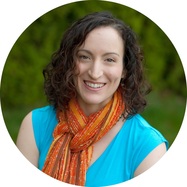 At a minimum, I recommend doing this exercise quarterly with the change in seasons - it is a natural time to assess your health and your goals. If you reach your goals quickly or want faster change you could repeat it weekly or monthly even - its totally up to you. If you look at this exercise and feel too daunted, then don’t do it alone - your friendly neighborhood Acupuncturist is an expert in preventative medicine (we have 3,000 years of clinical data behind us which supports living a healthy balanced life!) In my practice, in addition to helping my patients reach their immediate health care and pain relief goals, I always have an eye on improving my patient’s health long term. As a holistic medicine tied to the seasons and body rhythms, in my mind there’s just no other way - Acupuncture can’t treat anything without treating a little bit of everything. If you’re looking to keep your eye on the ball, Chinese Medicine has a plan to help you. If you have questions or want help devising your own plan, contact Rebecca via email anytime, or book online anytime! You can also post in the comments section and I’ll do my best to address your concerns. Until next time, ~Rebecca 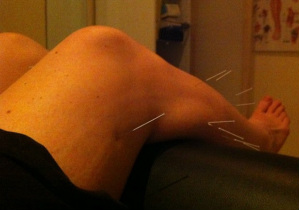 According to a recent article in the Journal of Orthopedic and Sports Physical Therapy Anterior Cruciate Ligament, or ACL, rupture is “one of the most physically, financially, and emotionally devastating sport-related knee injuries,” which is something I can personally attest to. I tore my ACL in 2003 and had reconstructive surgery because I wanted to return to sport which, at the time, was martial arts. I had good insurance then as well so my out of pocket costs were manageable, but I remember seeing the hospital bill - $50,000. It took an entire year of weekly acupuncture and Physical Therapy for me to participate in my sport at the level I wanted to, and it was two years before I didn’t notice my knee feeling different during activity. I am proud to say, however, that one year after my surgery I successfully completed a very vigorous 24 hour martial arts test including 12 hours of continuous fighting, running and forms. A decade later, my ACL repair is still holding strong with no concerns. What I didn’t know until I read this article, was how rare my case is. Only 44% of athletes successfully return to sport after an average 3-1/2 years following an ACL repair. When quizzed about their subjective experience of performance after a successful ACL repair and return to sport, only 50% percent of high-school and college athletes indicated that they were able to perform at their pre-injury level. Furthermore, up to 30% of athletes who return to sport after an ACL repair re-injure their ACL or tear the ACL on the opposite knee due to a number of factors, neuromuscular weakness and asymmetry primary among them. Due in part to the increased joint laxity and increased angle between hip and knee, female athletes with previous ACL repair are 4 times more likely to re-injure their knees after returning to sport compared to their male counterparts! My ACL repair actually puts me in the top 5% of female athletes who have an ACL repair. I absolutely credit my success to the individualized and dynamic Physical Therapy I received along with consistent Acupuncture treatments. I actually started acupuncture two days after my surgery and continued treatment every week for an entire year, and then every other week for 2 years thereafter. Even my surgeon was amazed with my recovery (and he was the surgeon for the Blazers here in Portland). Preventing an ACL InjurySo if you are engaged in sport, how do you prevent an ACL injury? Sometimes you just can’t, life happens, but you can greatly decrease the possibility of injury with proper neuromuscular training. According to this research article, of primary importance are the following:
Regular acupuncture is also recommended. Acupuncture can decrease and resolve minor aches and pains, keep muscles physically loose and energetically balanced, and cause natural endorphins and anti-inflammatories to be released by the body improving performance and recovery rates for minor injuries. Recovering from an ACL InjuryIf you are unfortunate enough to experience an ACL injury or tear, there is still a lot you to can do to ensure a strong recovery and decrease your likelihood of experiencing a secondary ACL injury.
My go to Physical Therapist for knee injury prevention, knee injury, ACL injury and ACL surgery recovery is my husband - Brian Kitzerow, DPT at Goodell Physical Therapy. He always keeps up on the latest research and has a thoughtful and thorough approach to every patient.  Portland's Park Blocks in Winter! Portland's Park Blocks in Winter! In Chinese Medicine Winter is dominated by the Water element which governs the Kidneys and the Bladder. The transition from one season, or element, to the next is the most delicate time for your health and the time when the most care needs to be taken if you want stay well. This last week before the official start of Winter, therefore, is an especially important time to be minding your Winter health P’s and Q’s if you want to avoid winter colds and flu’s. Fall, the season we are leaving, is dominated by the Metal element which governs the Lungs and the Large Intestine, so we are currently leaving the Metal season and moving into the Water season. The Lungs are connected to the skin in Chinese Medicine while the Kidneys are connected to the ears. If either organ is having trouble energetically with the seasonal change, viruses that include skin rashes and ear symptoms are more likely to be present. Its especially important, therefore, to take care of both of these energetic systems right now, and I’m happy to provide you with some acupuncture tips on staying healthy through the change of seasons! Acupuncture Health Tips for Staying Well into WinterStaying well through the transition of seasons is dependent upon caring for both the Metal and Water elements in the body, primarily the Lungs and Kidneys which are the Yin or “substantive” organs in the pairs listed above. A few simple tips can go a long way to helping you maintain the best health possible as Fall makes its final turn to Winter this week:
Remember that a little bit goes a long way. Try to incorporate one of two of these tips into your regime the next few weeks and give yourself a great immunity boost as the weather turns. Happy Winter Solstice! ~Rebecca Wow, what a week its been - opening of the Health Care Exchange sites, government shut down, a new hurricane?!! Eventful to say the least. Despite the brouhaha, the Affordable Care Act is in effect NOW and new plans are ready and available for review and enrollment. It is a landmark for our nation and fundamental shift to the way we approach health care in the U.S.. Despite the glitches and kinks, I can't help but be excited about what is to come. 10 Essential BenefitsWith the Affordable Health Care Act EVERYONE has access to quality insurance that covers the basics, and "the basics" refers to 10 categories must be included in every plan nationwide:
What exactly is included in these categories is slightly different state to state, however. In Washington these essential benefits include ACUPUNCTURE, 12 visits a year in fact. This means ALL PLANS be they individual or group that are purchased in Washington state will include Acupuncture benefits. How awesome is that? In Oregon the essential benefits category inclusions do not include Acupuncture specifically, so I've done my best to review the Individual and Family plans available in Oregon to give you a quick list of which plans include Acupuncture towards helping you choose the best alternative care benefits available. Group plans will be subject to employer review and approval so I have not combed through those here. If you are insured through your employer, however, and will be having a coverage switch in the coming year, I highly recommend you tell HR that you would like Acupuncture benefits included in your package if at all possible. Acupuncture is usually bundled with Chiropractic and Naturopathic care, as well as Massage in some cases, so advocating for alternative care coverage will help you get the best wellness maintenance and stress reduction treatment options out of your new benefits. Oregon Individual & Family Plans Covering Acupuncture in 2014Many of the insurance websites have been having glitches with the high volume of traffic this week, and some sites just don't list every benefit online, so my list isn't perfect but its as good as it can be in this time and place. Here, therefore, is a list of Oregon Individual and Family Plans currently including Acupuncture coverage:
If your insurer isn't listed, don't worry. Remember that this is a review of Individual and Family plans only and does not include group insurance plans many of which will have options to include Acupuncture and alternative care through your employer. You can review plans and get quotes through the exchange websites here: Rebecca Accepts Insurance!Want to make sure treatments at All Ways Well are covered? They are! I am a preferred provider with all the networks listed above except for OHP. Stay Tuned! Until next time.As further information about alternative care under the Affordable Care Act is available I will endeavor to keep posting updates on my blog so please stay tuned. If you have questions about your care or coverage and treatment at All Ways Well please don't hesitate to contact me via email anytime.
Have additional questions you'd like answered that I can help with or resources you need help finding? Just ask in the comments section below and I'll be happy to do my best to help you. Yours in Health, ~Rebecca One of my treatment specialties is Facial Rejuvenation Acupuncture, also known as Facial Acupuncture, Cosmetic Acupuncture, or the "Acupuncture Facelift." I like to scan around every so often and see what's online about this specialty to gauge public opinion and, in addition to a picture of Kim Kardashian doing it recently (which I won't subject you too here, but did post on my Facebook page on July 28th), I found this great video from Dr. Oz:
Dr. Oz Show, Acupuncture Facelift Its from last year but it is a very good presentation by a NY Acupuncturist, Dr. Tsai. By her point selection in the demo, she went through a similar training to mine if not the same one. Facial Rejuvenation Acupuncture really can make a difference in your appearance, especially in the realm of fine lines and wrinkles. I often see fine lines disappear and I'd say deep lines can reduce by 50-75% depending on your age and the line location. Facial Acupuncture is something I really feel passionate about, which I did not expect when I went through certification in 2006. I thought of it as a trend I could capitalize on to help me pay back my (somewhat insurmountable) student loans, but it has become one of my most favorite treatments to do because it is so transformative. There's something about seeing patients change visibly before my eyes that is magical. It even goes beyond the incredible healing that acupuncture in and of itself creates. I personally find facial acupuncture sessions even more deeply relaxing that other acupuncture sessions of every stripe and color. One session can brighten your complexion, and when the subtle and lasting changes of facial acupuncture really take hold, I can see in my patient's posture that they feel more confident and seated in themselves. It is something really beautiful to behold. Facial acupuncture often becomes a way to help their outside appearance match how they feel inside a little better, and this gives them more confidence and presence. The changes Facial Acupuncture creates can be close to Botox, but it takes time - at least 6 treatments at a frequency of 2x/week - to really make it stick. A standard course of treatment is 12 treatments total, the first six at a frequency of 2x/week and the next six at a frequency of once a week, to really get the best results. With regular maintenance after that, results really can last 2-5 years. The younger you are the longer the results generally last. I also find that if you stagger facial acupuncture tune up sessions with traditional facials, the results last even longer. I think the ideal time to start a full series is late 30's or early 40's. This is when permanent lines really start to become noticeable to the individual - not necessarily to the "world at large" but we are always our own worst critics. I've seen excellent results for people in their 50's and early 60's and fair results for people in their late 60's and early 70's as well, so it is feasible to pursue at any age. I do not love the term "Acupuncture Facelift," however, I think it is a little inaccurate. The effects of a facelift are very drastic and acupuncture techniques can never truly match that level of surgical intervention. I prefer the term Facial Rejuvenation or Cosmetic Acupuncture because I think it creates a more realistic expectation for the patient. Call it what you will - the results do stand and are tried, tested, true and completely natural. It is the closest thing you can get to a natural facelift, so I suppose if that is what people want to call it I shouldn't complain. If you meet somebody interested in a natural or acupuncture facelift, however, send them my way and I can set them straight about what actually can and cannot be accomplished! ~Rebecca 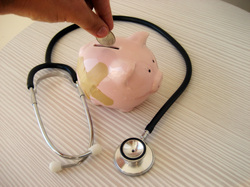 Health insurance changes are coming down the pipeline, and the new plans under the Health Care Act (aka "Obamacare") will be unveiled October 2013 and will go into effect January 2014. I find this is causing concern for some, and that the biggest concerns are about cost and a general sense that people don't know what is going to change. The Oregon Insurance Division has put out a great brochure reviewing the basics of what is included in all new plans and how rate review (regulation) works in Oregon specifically. Click the button below to download or be linked to the brochure in PDF format. Its actually very exciting, and most consumers are going to benefit from the new plans. If you are insured through a large employer it is highly unlikely anything is going to change aside from a few new plan inclusions. Small business employees and privately insured individuals will see the biggest changes in the realm of covered services and rates, but there is much more rate regulation and review in place so the rate changes should be minimal and generally beneficial to the consumer - especially to older Americans. If you don't want to read the brochure, here are some of the more notable points listed:
The Rehabilitative and Preventative care are the bigger areas of change, though "preventative" means wellness exams by your PCP, not alternative medicine (3,000 years of history and clinical evidence for preventative medicine here on the Chinese Medicine side of things....helloooo) fyi.
Most plans in Oregon will have a Complementary and Alternative Medicine (acupuncture, naturopathic, chiropractic, maybe massage) "rider," or supplemental plan, that you can include for an additional premium, but CAM services are not part of the Oregon essential benefits list. They ARE part of the Washington State essential benefits list, so ALL PLANS ORIGINATING IN WASHING STATE WILL INCLUDE COVERAGE FOR ACUPUNCTURE starting January 1st 2014! I am ridiculously excited about this, if you can't tell, but it is quite amazing that Washington has included CAM services in their essential benefits list and hopefully, as our focus in the US shifts from treating disease to treating "dis-ease" and heading problems off at the curve through preventative medicine and a wellness focus, this will become the norm that all states incorporate. Ah, an acupuncturist can dream... If you want to review the full Oregon Insurance Division brochure, please click the button below. There is also a button for the Cover Oregon health exchange site where you can learn more about how the health exchange works, enter your household information to calculate if you are likely to be eligible for a subsidy (i.e. tax refund to help pay the cost of your insurance premium starting in 2014) and sign up for alerts to stay in the know about health care exchange happenings. So click on, read up, and stay tuned here as well - I will be trying to disseminate information about health care act related changes, sign up dates and more through my blog as best I can. I also send out information via my eZine, so if you haven't signed up yet - its time!! Until my next inspiration and installment, ~Rebecca Watch Eat, Fast and Live Longer with Michael Mosley - Preview on PBS. See more from Michael Mosley. So I wasn't intending to watch Michael Mosley's documentary about fasting for health and wellness on OPB Wednesday night, but I found myself zonked out on the couch at just the right time. Despite my intention to catch up on So You Think You Can Dance (I'm mildly addicted, just mildly...) I was mesmerized and just had to check it out.
Let me start by saying that fasting is not a traditional part of Acupuncture and Chinese Medicine. It is a relatively common naturopathic technique, and can be part of an elimination diet, however, beyond being something gaining popularity for general health. It is not something to be undertaken without supervision if you have chronic health concerns, especially if you are diabetic, and is not appropriate while pregnant or nursing. That said, theoretically being overly hungry is a bad thing from an energetic perspective. Hunger is a sign that your Spleen and Stomach Qi are waning and if they wane too far, your body pulls energy from the Kidney - your foundation and energetic reserve - to continue normal (energetic) body processes. Intermittent fasting involves shorter fasting times at more regular intervals, and I believe that this is more in line with Traditional Chinese Medicine theory since you don't go for such long periods of intense hunger. When it comes to longevity, modern research is also clearly showing that calorie restricted diets can contribute to long life. Even more interesting is the recent research - which this documentary reviews and explores - about intermittent fasting for helping to regulate insulin levels (in non-diabetics), decrease cholesterol, control weight and improve health. To clarify again, intermittent fasting is short term regular fasting - meaning not eating for 6-8 hours anywhere from two to four days a week on an alternating pattern i.e. "feed" one day and "fast" another. Seemingly, this has a similar effect as semi regular long-term fasting (meaning a 4 day fast every few months) and has comparable health effects to a daily calorie restricted diet. If you think about it from a hunter-gatherer past perspective, it kind of makes sense that intermittent fasting would be somewhat natural to our bodies. If you follow the seasons and the herds, you are constantly going between periods of feast and famine - indeed, our body stores fat to prepare for leaner times - but in modern life, the average American with a home and job doesn't have times so lean that they are forced to go without, even for a 6-8 hour period, unless they are just too busy to eat. Fast food and the carb+meat+dairy heavy modern American diet is also very calorically dense - again not lending itself to "famine" like conditions even for a short while, without making a conscious effort to achieve them. One of the statistics in this documentary that really caught me by surprise was about lifespan during the Great Depression. Did you know that life expectancy during the Great Depression increased by 6.2 years? Yeah, leaner times, longer lives. Who knew? Another proponent of intermittent fasting is Walter Willett, MD, the Harvard Researcher and author of "Eat, Drink and Be Healthy" which has long been one of my favorite books about general healthy eating. This book advocates for a diet of 1600 calories a day on average, but if you have a hard time maintaining that he recommends fasting one day a week to keep your weekly calories to a minimum. Not a bad plan, and definitely in line with this recent research. All this said, however, the benefits of intermittent fasting do not mean that if you fast intermittently you can eat whatever you want and not exercise - this method is a technique to help you reach and maintain your health goals, not a way to avoid eating right, supplementing right and exercising. Indeed, regular fasting means your nutritional needs become that much more focused on the days that you do eat full meals, and make supplementation for health that much more important to help you ensure that you are getting the nutrients you need for a long and healthy life. What I like best about the idea of intermittent fasting is that it feels moderate to me. You aren't doing anything extreme for any prolonged period of time - you're just taking a break from eating for a short duration - so there's a focused time delimited period of cravings that I think most anyone can overcome. Again, it doesn't mean you can eat whatever you want on "feed" days, but it does help balance out an extra piece of cake here and there, so that you don't feel like you have to maintain a "perfect" diet every day to be well; you just have to do the best you can do and indulge consciously. For me? Intermittent fasting is the newest addition to my personal repertoire of activities for good health. Exercise is tough at the moment as a mom of two little ones, but I get just enough not to feel insane. Supplementation is a given and I participate in the same All Ways Wellness program I promote for my patients taking regular multivitamin, fish oil, green food, B vitamins and probiotic supplements and get acupuncture regularly to stay on track. Considering that ALL my grandparents who died of natural causes died of heart attack or stroke, to say heart disease is risk factor for me is an understatement. With a congenital heart murmur to boot, I can't afford to mess around with my heart health if I want to be here to see my children grow up some day, so if intermittent fasting can help give me a leg up on keeping my cholesterol down I'm all in. My plan is to start with once a week for the next 4-6 weeks with a goal to increase to twice a week after that. More than twice a week would be difficult for me between the kids and work (my son won't eat if I'm not sitting at the table eating myself at this stage...), but evidence suggests that even two days a week can have a significant impact on your long term health, so here goes! I'll check in here about my progress around the 6 week mark, so if you're interested be on the lookout for a "Rebecca Fasting Experiment Update" to come. Yesterday was my first day - I figured fasting at work when I'm busy would be easier than fasting at home - and it went great. Plenty of tea and water later, I felt like I sailed through the day and was almost hyper-productive. Wish me luck for next week folks! Until next time, ~Rebecca Its National Psoriasis Awareness Month, hooray! And I've definitely found that people don't often realize that acupuncture and Chinese Medicine can be an effective treatment for this condition. Did you know?
The video above doesn't get into the details of diagnosis and treatment, but it is a nice little into to what the beginnings of an acupuncture treatment for this condition might look like, and a good reminder about that hallmark of Chinese Medicine - syndrome differentiation. Namely, that everyone presents with their own unique set of signs and symptoms associated with any given condition and that each individual will therefore be treated individually and uniquely. There may be some general guidelines or points that are commonly recommended for any given illness, but since different people with the same illness will have different tongue and pulse pictures and other associated symptoms, their energetic diagnosis and treatment will therefore be unique. But enough about that - Psoriasis is our topic of the day! In Chinese Medicine all skin conditions have a connection to the Lung meridian, so they often go hand in hand with things like asthma, allergies and acne and thanks to the magic of energetic medicine, these things can therefore be treated concurrently. The Lungs also receive their energy from the Spleen (read "digestion") so digestive issues are also commonly seen in combination with psoriasis and other skin conditions. This means that diet and lifestyle are important factors to look at as part of an overall treatment plan. Blood heat is also a common underlying energetic cause or factor, and when you add in the Spleen/digestive connection, hot and spicy foods are often found to be aggravating. Avoidance of these foods is recommended during a flare up in particular. Also associated with psoriasis can be joint pain in the case of psoriatic arthritis and I have to say that this is a place where acupuncture really shines as a treatment. Electro acupuncture in particular has been well researched for the treatment of joint pain, especially knee pain, and when you combine the western scientifically verified endorphin and anti-inflammatory release associated with electro acupuncture, with the energetic benefits of meridian balancing associated with all acupuncture, the effect can be pretty amazing over time. A course of treatment is recommended - as a natural method of health care acupuncture and Chinese Medicine work with the body's natural rhythms so it can take time to create change - but an average course of treatment in my clinic is 6 treatments over a 6 week period. Generally noticeable results begin to be seen after 2 treatments, if not immediately, but creating lasting change takes time. The longer you have suffered from a condition, the longer it can take to treat as well, so if you have suffered for many years you can expect several months of treatment before it is recommended to reassess success and re-evaluate your treatment plan. If your condition is chronic you may also want to plan regular acupuncture tune ups into your wellness plan every 4 to 6 weeks once your symptoms are under control to keep flare ups at bay. I also always recommend topical castor oil to all of my patients with psoriasis and eczema. With the soothing emollients and the natural anti-inflammatory effect inherent to this compound, it is an excellent topical treatment for these kinds of skin conditions. Its a little sticky, so I generally recommend using it at night and letting it soak in while you sleep. After a couple weeks of daily use, the effect can be drastic from this alone. If you're interested in learning more please don't hesitate to contact me or book an appointment or consultation online any time. Chinese Medicine has over 3,000 years of experience behind it in treating a variety of conditions, including many things you might not think of when you hear the word "acupuncture" so if you aren't sure what may or may not be helped by this natural, gentle and effective medicine, please don't hesitate to drop me a line and ask! Until next time, ~Rebecca |
AuthorsRebecca M H Kitzerow is a Licensed Acupuncturist practicing in La Center, Washington. With over a decade of experience she has won 10 Nattie consumer choice awards from Natural Awakenings Magazine since 2014. Archives
July 2024
Categories
All
|
Photos from Hey Paul Studios, BeGreen_Studio, Pawel Pacholec, 1950sUnlimited, toulupaliaqaz, Joelk75, OnTask, Robert Gourley, cnu_sports, Mitya Ku, wuestenigel (CC BY 2.0), FootMassagez, 401(K) 2013, Mariana Heinz, @EdwardTerry, fishhawk, liverpoolhls, torbakhopper, Boemski, dolomitibl, Driscolltheque, Dave n Laura, Vaping360, MVWorks, Life Mental Health, MVWorks, mikefats, Scot Nelson, jfl1066, wZa HK, ruurmo, Guadalupe Cervilla, Army Medicine, GViciano, torbakhopper, adrigu, Saulo Cruz, Ben Cumming, marniejoyce, kcxd, JasonCorey, kanenas.net, Live to Create Photography, gm.esthermax, Unique Hotels Group, Zenspa1, mysiana, Tobias Lindman, Leader Nancy Pelosi, Kristoffer Trolle, swanksalot, Bill Selak, Parker Knight, stimpsonjake, Gedankensprudler, SuperFantastic, tonynetone, marniejoyce, JeepersMedia, Illusive Photography, 'Ajnagraphy', Iban Torras, scotted400, gtall1, dvanzuijlekom, BPPrice, Skley, torbakhopper, Renato Ganoza, anka.albrecht, QUOI Media, Public Domain Photos, Instant Vantage, Victor Tongdee, Free Grunge Textures - www.freestock.ca, sportEX journals, Nadja Tatar, angela n., marniejoyce, MVWorks, Karolina Kabat, Thomas Fisher Rare Book Library, UofT, ginnerobot, tracilawson, haven't the slightest, My Photo Journeys, Pierre Willemin, Florena_Presse, SuperFantastic, colindunn, zzkt, TraumaAndDissociation, ER24 EMS (Pty) Ltd., shixart1985 (CC BY 2.0), marniejoyce, Tomás Fano, freestock.ca ♡ dare to share beauty, Archives New Zealand, Jaykhuang, airdrie.m, Go-tea 郭天, OnTask, wuestenigel, focusonmore.com, Disney | ABC Television Group, Andrew Gustar, Didriks, ConstructionDealMkting, charlywkarl, barnimages.com, Lel4nd, runwaypilates, michaelstephanfotografie, McLevn, TraumaAndDissociation, eLife - the journal, Lars Plougmann, wuestenigel, shixart1985, boviate, davis.steve32, kevin dooley, @the.photoguy (insta), frederic.gombert, Feathering the Nest, Victor Tondee, shixart1985, wuestenigel, Joe K Gage, kennethkonica
 RSS Feed
RSS Feed
